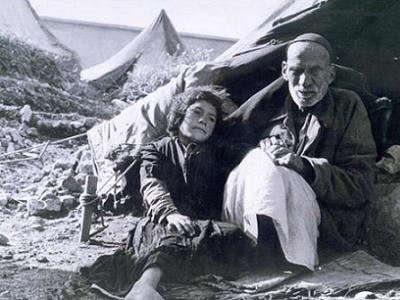
By Ramzy Baroud
In mainstream Israeli politics, history books, literature and collective imagination, the Palestinian Nakba never happened. If the pain and suffering of a nation is acknowledged, then the people themselves would, naturally, have to be acknowledged as well. This, Israel could not do.
In fact, the infamous declaration made by former Israeli Prime Minister, Golda Meir — that Palestinians “didn’t exist” and that “there is no such a thing as a Palestinian people” — was far more dangerous than the racist comment that many understood it to be, justifiably so. The statement was made two years after the Naksa, which saw the Arabs defeated in 1967 and Israel’s military domination of all of historic Palestine. The more land that Israel seized illegally by military means, and the more that Palestinians were ethnically-cleansed from their ancestral homeland, the more that Israeli leaders felt the pressing need to erase Palestinians from the annals of history as a people with an identity, a culture and an entitlement to nationhood.
If Palestinians actually “existed” in Israel’s imagination, there can never be any moral justification for its creation; there will never be any Israeli narrative that could be powerful enough to rejoice at the birth of the Israeli “miracle” that “made the desert bloom”. That blood-stained birth callously required the destruction of an entire nation; people with a unique history, language, culture and collective memory. It was thus absolutely necessary for the Palestinians to be wiped out to quell any possible sense of Israeli guilt, shame and legal and moral responsibility for what has befallen millions of dispossessed people.
In the absence of a problem, there is no obligation to fix it or even relevance in doing so. Thus, the denial of the Palestinian people and homeland was the only intellectual formulation that would allow Israel to sustain and promote its national myths. Not surprisingly, the Israeli logic was convincing enough for those, driven by political necessity, religious zeal or simply self-delusion, who felt the need also to celebrate the Israeli “miracle”. Their new mantra, as repeated by one of America’s most opportunistic and, indeed, ignorant politicians, Newt Gingrich, a few years ago, was simple: “Palestinians are an invented people.”
Despite a fledgling movement in Israel that attempts to challenge the Israeli narrative, in Israeli literature the Palestinian is a “mute shadow”, as described by Elias Khoury. The shadow is a reflection of something real, but intangible; it is mute, so that it can be talked to but can never talk back. The “shadow” Palestinian both exists and does not exist.
Nearly seventy years after Palestinians were exiled from their homes when Israel was created in their land, and although their numbers have grown to millions, they remain a mute shadow: random beings behind a wall; multitudes gathered passively with pale faces at military checkpoints; mere numbers and not real beings caged in Israeli jails.
While the pseudo-intellectual equivalent of Gingrich and the political clones of Golda Meir still dominate most platforms concerned with Palestine, and continue to vent hatred and historical distortions, they are making little headway. The Palestinians’ fight for their rights throughout the years has resurrected them constantly as a nation, despite every Israeli attempt to deface their national narrative. As in Rene Descartes’ dialectics that delivered the realisation, “I think, therefore I am,” Palestinian existence is not merely hinged on mere thought, but also action, namely resistance. Resistance here is not a casual reference to combat in some battlefield, but the resistance against the demise of a nation, one with an elaborate, rooted culture that has maintained its identity despite repeated wars, invasions, colonial adventures and military occupation. While the Palestinian culture is linked intrinsically to Islam, Christianity and the wider Arab cultural space, these connections supplement, not supplant, the inimitable Palestinian experience.
The good news is that Israel has, thus far, failed. Not only did Israel fail to erase or even subvert Palestinian identity, though, it is now also attempting to reclaim the Palestinian narrative altogether. Terms such as the “Jewish Nakba” are becoming omnipresent, in reference to the alleged ethnic cleansing of Arab Jews from their countries during the war of 1948.
While the attempt to rewrite history is disingenuous at best, it signals the growing signs of defeat for the Israeli discourse. The term “Nakba” has proven to be too powerful a reference to the origins of Israel, established with genocidal intent and complete disregard for another nation.
Nevertheless, the Nakba must be in a constant process of re-evaluation and, if needed, redefinition. The Nakba is not merely a question of history, but an ongoing reality that has affected several generations of Palestinians. It is not a celebration of victimhood, but the impetus for an ongoing resistance. It is not an “event” assigned a specific political context and analysis, but is now a state of mind; the Palestinian people’s strongest rapport between them and their past, present and future.
No, Palestinians should not be defined perpetually by the Nakba. Once justice and freedom are achieved, the Nakba must be reassigned a different meaning, a suitable role in the collective memory of the Palestinian Arab nation. “After the struggle is over, there is not only the demise of colonialism, but also the demise of the colonized,” wrote Frantz Fanon. For now, however, the Nakba must live, not only as recognition of the brutality of colonialism, but also of the pride, dignity and resistance of the colonized.
(This article originally appeared in Middle East Monitor.)
– Dr. Ramzy Baroud has been writing about the Middle East for over 20 years. He is an internationally-syndicated columnist, a media consultant, an author of several books and the founder of PalestineChronicle.com. His books include “Searching Jenin”, “The Second Palestinian Intifada” and his latest “My Father Was a Freedom Fighter: Gaza’s Untold Story”. His website is www.ramzybaroud.net.





Wise words